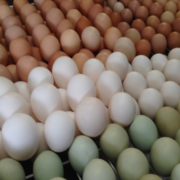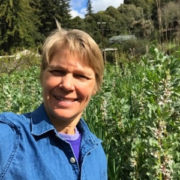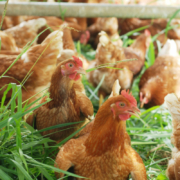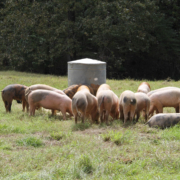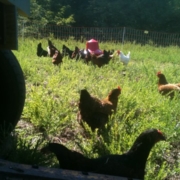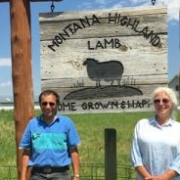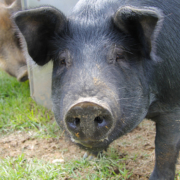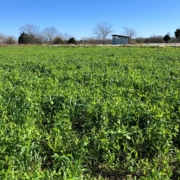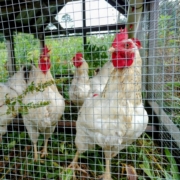Sol Seeker Farm: Raising a Pastured Poultry Business
 Print This Post
Print This Post
By Ann Baier, NCAT Sustainable Agriculture Specialist
I recently had the opportunity to talk with Edgar Mendoza Samaniego of Sol Seeker Farm, in the Spanish-language podcast Producción Avícola de Pastoreo, about the business of raising poultry on pasture.
Our conversation addresses some of the many questions that all new farmers need to ask:
- How can this poultry enterprise be economically viable?
- What are the steps to establish layer and/or meat bird enterprises?
- What are the key start-up costs and investments for each type of enterprise?
- How can I maintain cash flow for my farm and family?
- What are the phases of growing the business to an appropriate scale to match farm and family priorities and balancing production capacities (land, labor, cash flow/capital investment) with marketing channels and government regulations?
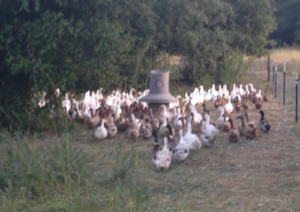
Ducks on pasture at Sol Seeker Farm. Photo: Ann Baier, NCAT
Edgar and his wife, Kaley, own Sol Seeker Farm, focusing on pastured poultry. They started their farm enterprise in 2014, selling eggs from 50 laying hens at one farmers market. As their business grew and developed, the farm’s production, processing, and marketing practices have evolved. Sol Seeker Farm now raises eggs and poultry meat from both chickens and ducks, seasonal Cornish game hens, and Thanksgiving turkeys. Marketing channels include several farmers markets, independent grocery stores, a CSA, and (added during the pandemic) online sales with home delivery.
Investment of land and capital, labor, and knowledge are key to all production systems. Cash flow is critical, especially in a new business. Sol Seeker Farm has grown in phases, with diverse enterprises. Raising broilers has enabled the farm to achieve a return on its investment in approximately eight weeks. This income provided a necessary source of cash to purchase feed to raise their layer flock until pullets reached 6 months of age and began producing eggs to sell. Over the past several years, Edgar and Kaley have invested their sweat and earnings into the farm’s assets, purchasing necessary equipment for the business, including a truck, egg washer, and walk-in freezer. After moving between three different rented farm locations, purchasing their own land in 2020 provides stability and focus at a single production location. They’ve constructed fencing and rely on livestock guardian dogs to protect the flocks from predators. The guard dogs work as a team to protect the whole pasture area where poultry are raised. The foraging birds are rotated from one part of the field to another to allow the pasture to recover.
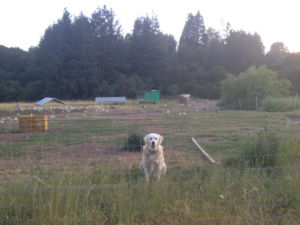
Sol Seeker Farm poultry raised on pasture, with livestock guardian dog on watch. Photo: Ann Baier, NCA
Planning for their current phase of growth, Edgar and Kaley developed a new poultry meat-processing plan. The number of birds they planned to raise would surpass the number of birds that could be processed on their own farm under federal and state regulations and exemptions. They made the decision to take their meat poultry—chickens and ducks— to a USDA-inspected processing plant. Edgar explained the impact of this change on their production practices. In contrast to the smaller number of birds they had previously processed on-farm and sold fresh, they now raise broilers and meat ducks in fewer, larger batches to meet processor minimums. Receiving larger quantities of product at once necessitated purchase of a freezer to store product on the farm and to sell frozen meat gradually. They had to explain to their customers why they are now selling frozen poultry rather than fresh. They also had to explain the change in their labeling—why they could no longer sell their meat as organic. Even though their birds are still raised organically, processing and packaging the birds in a USDA-inspected plant that is not certified organic means that Sol Seeker can no longer label or represent its final product as organic.
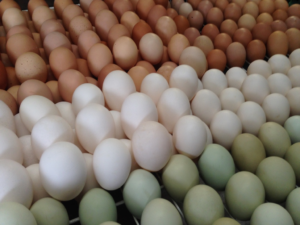
Sol Seeker Farm multi-colored eggs from different breeds of hens, all raised on pasture. Photo: Ann Baier, NCAT
The farm’s eggs, however, are sold as certified organic because they are raised with certified organic management practices, including organic feed, and washed and packed on-farm in their certified organic facility. They use two different labels, both of which meet all government (USDA and State of California) regulations. A simple label is printed economically on-farm and used for direct sales; a professionally printed (nice-looking but more expensive) carton label incorporates additional elements, such as bar codes, that are required for selling eggs in stores.
Raising poultry on pasture has the potential for (though not a guarantee of) good land stewardship, humane treatment of birds, and economic viability. Realization of that potential depends on planning and preparation for challenges and opportunities where you are, with anticipation of adapting to changing conditions in natural, market, and regulatory environments. Working out enterprise budgets with real-world numbers will help farmers better plan and manage their time, money, and other resources. Analyzing records of actual farm production activities (including the value of their own time) and financial accounting (including overhead expenses) can inform future decision-making. What are the gross margins and net benefits of your farming enterprises? How can the farm enterprise contribute to fulfilling holistic goals of positive financial return, health of natural resources and ecosystems (land, soil, water, air, plants, animals, and climate), and the well-being of the family and community?
Edgar emphasized how helpful it has been to learn from other farmers in the region, including members of the American Pastured Poultry Producers Association, as well as from as workshops offered by California Farmlink and business development guidance from Kitchen Table Advisors. They have also begun working with Kitchen Table Consulting. ATTRA serves as another excellent resource for farmers looking for assistance on a wide variety of agriculture topics.
Asked what advice he had for other beginning farmers, Edgar urged: “Do your calculations carefully!” Head over here to listen to the full episode.
Related ATTRA Resources:
Processing Poultry Meat for Sale: The Right Approach for Your Farm?
Other Resources:
American Pastured Poultry Producers Association
Niche Meat Processor Assistance Network
This blog is produced by the National Center for Appropriate Technology through the ATTRA Sustainable Agriculture program, under a cooperative agreement with USDA Rural Development. ATTRA.NCAT.ORG.

